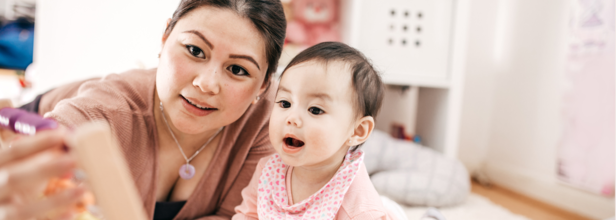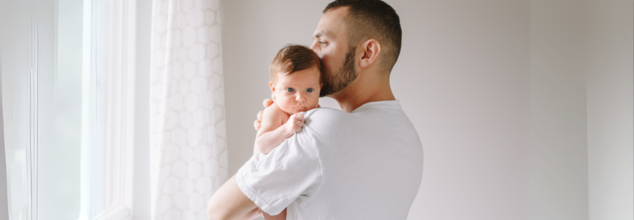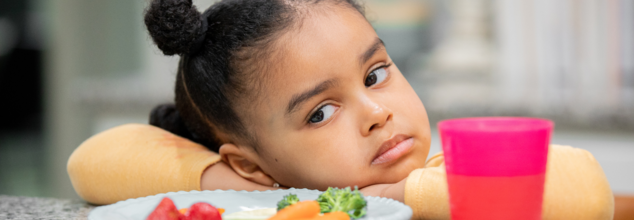- Health Conditions A-Z
- Health & Wellness
- Nutrition
- Fitness
- Health News
- Ayurveda
- Videos
- Medicine A-Z
- Parenting
- Web Stories
When Do Babies Say 'Mama' And 'Dada'? Tips To Help Them Say Their First Words

Image Credit: Canva
Hearing a baby's first words is a magical milestone for every parent. The journey to these words, however, is filled with babbling, cooing, and endless anticipation. While each child is unique, there are fascinating insights into when and how babies start saying "Mama" and "Dada." Here's an in-depth look at this heartwarming stage of development, with expert advice to help parents support their little ones on this linguistic journey.
Babies develop at their own pace, reaching milestones on unique timelines. That said, most babies start experimenting with sounds around seven months of age. These early sounds often include repetitive syllables such as "mamamama" and "dadadada." At this stage, these are more babbling experiments than intentional words.
By nine months, many babies start babbling "Mama" or "Dada" on purpose, even if they don't really understand what those words mean. For instance, your little one might say "Mama" while looking at you-or even at the family pet or a favorite toy!
It is usually around the one-year mark that babies start using "Mama" or "Dada" correctly in context and use each parent's name specifically. This is an important milestone in their language development and social connection.
Why Are "Mama" and "Dada" Often the First Words?
Several factors make "Mama" and "Dada" prime candidates for a baby's first words:
1. Frequency of Use
Babies tend to repeat the words they are most exposed to. As a result, parents repeat these words in interaction with their child, and therefore become some of the first sounds a baby attempts to repeat.
2. Phonetics: Easy to pronounce
The "m" and "d" sounds are the easiest sounds for babies to pronounce. Since "Mama" and "Dada" are two syllables with the same sounds, it's easy for the little one just learning how to control the vocal cords to repeat.
3. Emotional Connection
Babies are instinctively attracted to words that elicit strong emotional reactions. The enthusiastic response of the parents to "Mama" and "Dada" motivates the babies to repeat the words, thus reinforcing the association.
Who Wins the First Word Race: Mama or Dada?
The debate over whether a baby says "Mama" or "Dada" first is a playful debate in many households. Research indicates that "Dada" is often said first, mainly because the "d" sound is easier for babies to pronounce than the "m" sound.
However, this is not a rule that is always set in stone. Sometimes, babies prefer "Mama" more, especially when they spend more time with mom or find the "m" sound easier to reproduce. More importantly, this order of the first words uttered does not signify a baby's preference for one parent over the other; it is just a matter of phonetic ease and exposure.
Tips to Encourage Your Baby to Say Mama and Dada
While your baby will speak on their own schedule, there are gentle ways to encourage their linguistic development:
1. Repeat and Reinforce: Frequently say "Mama" and "Dada" while pointing to yourself or your partner. Repetition helps babies associate the sounds with specific people.
2. Tactual Method Hold the baby's hand against your mouth and say "Mama" or "Dada." The feedback by touching can also facilitate understanding how the sounds are formed.
3. Photobook: Create a Simple Photo Album with pictures of "Mama" and "Dada." Sit next to your baby, show the picture one at a time, and say the names out loud. Ask such questions as, "Who is this?".
4. Read to Your Baby: Use books with simple, repetitive language that contains "Mama" and "Dada." Reading not only is beneficial for language development, but it also helps cement the bond between parent and child.
5. Respond to Babbling: Interact with your baby whenever they babble by matching sounds and encouraging dialogue. Positive reinforcement of their attempts at communicating encourages them to continue the effort.
What if your Baby isn't Saying Mama or Dada?
While it's normal to be concerned if your baby hasn't achieved this milestone, remember that every child develops differently. However, if your baby hasn't started saying any words by 12 to 15 months, it is a good idea to see a pediatrician. They might check for hearing or speech issues and provide guidance tailored to your child's needs.
Are Boys More Likely to Say Mama or Dada First?
Interestingly, there is no scientific evidence to indicate that boys or girls are more likely to say "Mama" or "Dada" first. The timing and choice of first words depend entirely on the individual baby and their unique experiences, not their gender.
Tips for Building Language Skills in Babies
Once your baby masters “Mama” and “Dada,” they’ll soon begin adding new words to their vocabulary. Support this growth by:
- Naming Objects: Consistently name objects during play or daily routines to help your baby associate words with their meanings.
- Encouraging Imitation: Use simple sentences and encourage your baby to repeat them.
- Celebrate milestones: Cheer enthusiastically when your baby learns a new word, as positive reinforcement strengthens their motivation.
Hearing your baby say “Mama” or “Dada” for the first time is a moment you’ll treasure forever. While waiting for this milestone can be a test of patience, the journey is just as rewarding as the destination. By engaging with your baby, encouraging communication, and celebrating their efforts, you’re laying the foundation for a lifetime of meaningful conversations.
The first word of every baby is a testimony to the child's growth and the love and support he or she gets from the parents. Therefore, whether it is "Mama" or "Dada," your baby will surely become a confident little communicator in no time.
Important Milestones: Your Child By One Year. CDC
Language Development: 8 to 12 Months. American Academy of Pediatrics.
Are Fathers Still Reluctant To Be Primary Caretakers Of Their Children? Study Finds Dads Take Shorter Parental Leaves

The first few months of a baby's development is a very important and stressful period of time for the parents. Having a newborn and tackling unfamiliar situations and problems while also worrying about the child’s well-being is a herculean task, too much to handle for a single person. That is why both mother and father must step up and support each other through this time and hence many parents take paternity leaves. These leaves allow parents to only focus on childcare and not work obligations.
Taking time off work when a baby arrives benefits both fathers and their newborns. However, a new study reveals that most dads still don't take much parental leave, often because they simply can't afford to. The research, published in Pediatrics, found that only 36% of new fathers took more than two weeks of leave, while a significant 64% took two weeks or less.
Financial Hurdles Prevent Longer Stays
This study, which tracked the health and behavior of fathers, surveyed 261 men in Georgia who had children in 2018 or 2019. Of the 240 employed fathers, roughly 73% took some parental leave. However, only about half of those had at least some paid time off, and 20% relied solely on unpaid leave. Nearly 43% of working fathers expressed a desire for more time off but couldn't take it, primarily due to financial concerns. Many cited the inability to afford unpaid leave, insufficient accrued time off, or the fear of losing their jobs.
Why Paternity Leave Matters
Experts agree that when fathers take time off after a baby is born, it's linked to better health for the infant and improved parenting skills for the dad. It's crucial for fathers to experience both the challenges and joys of being a parent. The best way for them to do this is to step away from work and spend time with their new baby without facing money worries or the stress of potentially losing their job. Supporting fathers in taking leave can have a significant positive impact on families.
Paternity Leaves Helps Father Adapt
According to Harvard Business Review, research confirms it helps fathers bond with their babies, aids in the baby's development, and strengthens the parents' relationship. But there's a powerful, lesser-known benefit emerging from new studies: it provides a unique form of brain training for fathers.
Paternal Brain Training
Parenting isn't simply an innate ability. While we've long known about the amazing changes a mother's brain undergoes to prepare her for caring for a newborn, new research shows that fathers' brains also transform. These changes happen even without the physical experiences of pregnancy and childbirth or the associated hormonal shifts. This "parental instinct brain training" is possible for all parents.
Over the past ten years, scientists have learned a lot about neuroplasticity, which is the brain's incredible ability to change its structure and how it works based on new experiences. Becoming a parent is a major time for the brain to adapt. Experts studying this shift emphasize that "fathers are made, not born," meaning spending time with infants is crucial for developing the fathering brain.
For dads, changes in their brains, triggered by their babies' cues, are directly linked to their connection with the infant. This suggests these brain changes actually prepare them for fatherhood. A key finding is that the most impactful brain changes come from active, engaged experience. No one is naturally perfect at being a parent from day one. It's the effort of fully engaging with the baby that drives these brain changes, giving dads the necessary tools to grow into their role over time.
Why Time with Baby Matters
Quality one-on-one time with your baby is crucial. More time spent alone with an infant leads to bigger brain changes, helping dads become better, more natural caregivers. A study comparing dads in California and Spain showed differences. Spanish dads, who often have more generous paternity leave, showed more brain changes related to focused attention. This suggests dedicated time acts like a "brain workout," preparing dads for parenting. Paternity leave essentially gives you a free brain-training program. The more you engage, the more your brain adapts, making you a more responsive parent over time.
Do Not Force Your Picky Eater Child To Eat - Picky Eaters Dos And Don'ts Guide

(Credit-Canva)
Many people mistake picky eaters for kids who are just being difficult and do not wish to eat certain foods. While that could be the case, many kids who are picky eaters have sensory issues that cause them to physically dislike certain textures or tastes.
Many parents try to force their children to eat foods they do not like, thinking that by being strict they can ensure their child gets the proper nutrition they need. However, not only does this not work, but it can also discourage the kid from eating as they will quickly associate eating as an unpleasant experience. So, how does a parent ensure their kid gets the proper nutrition they need, while also making sure they feel safe?
There are many ways to help your child expand their food preferences, but one must know the causes and different ways you can encourage them to eat better.
What Causes Picky Eating In Kids?
According to a 2018 study published in the Proceedings of the Nutrition Society, picky eating is a very common challenge many parents face during their child's early years. There isn't one clear way to define or pinpoint it, and experts don't fully agree on the best method to identify a picky eater.
Early Feeding Problems
If a child experienced significant difficulties with feeding during their infancy, such as trouble latching or swallowing, it can sometimes set the stage for picky eating habits later in childhood. These early struggles can create negative associations with food.
Late Introduction of Lumpy Foods
Delaying the introduction of chunky or textured solid foods during the weaning period, when infants transition from milk to solids, can hinder their acceptance of different food consistencies. This might lead to a preference for smoother purees only.
Pressure to Eat
When parents try to force or excessively coax a child to eat, it often backfires. This pressure can make mealtime stressful and create resistance in the child, turning eating into a power struggle rather than an enjoyable experience.
Early Pickiness
If a child displays early signs of being particular about food choices, especially if their mother expresses worry or anxiety about these behaviors, it can sometimes escalate. Parental concern can inadvertently reinforce the picky eating.
What Can Help Prevent Picky Eating?
The study also gave some simple strategies can help in preventing or reducing picky eating behaviors:
Fresh Foods
Regularly offering a wide variety of fresh, wholesome foods exposes children to diverse tastes and textures from an early age. This consistent exposure helps them develop a broader palate and acceptance of different ingredients over time.
Family Meals
Eating the same meal as your child encourages them to try new foods by seeing you enjoy them. It creates a positive and shared mealtime experience, fostering a sense of belonging and making food exploration feel more natural and inviting.
Tips To Help Kids Overcome Their Picky Eating
Try it First
Children are great imitators! When you visibly enjoy a new food yourself, showing them how much you like it, your child is far more likely to feel curious and brave enough to give it a taste. Lead by example.
Make Food Fun
Transform mealtime into a playful experience by arranging fruits and vegetables into silly shapes or funny faces on their plate. This simple trick makes eating an engaging game, shifting focus from "having to eat" to enjoyable discovery.
Let Them Choose
Empower your child by offering a limited selection of healthy food options and letting them make the final decision. This sense of control often reduces resistance and increases their willingness to explore and try what they've picked.
Serve with Favorites
Always pair a new or less-preferred food with a comforting dish your child already adores. This familiar favorite acts as a safety net, making the new food seem less intimidating and more approachable when presented together.
Don't Waste Food
When you have small amounts of uneaten healthy food, instead of discarding them, freeze tiny portions. This clever strategy allows you to reintroduce the food later, reducing waste and providing more opportunities for exposure.
Be Patient
Remember that acceptance takes time; it's completely normal for a child to reject a new food multiple times before liking it, sometimes over ten attempts. Simply reintroduce it after a few days without pressure.
Smartphones For Kids Becomes A Common Trend - Average Age For Smartphones Revealed To Be 9

(Credit-Canva)
Nowadays, it is very common to see kids as young as 1st or 2nd graders having phones. While having phones on their person helps parents keep a closer eye on them, but is this much exposure to electronic devices, ok?
A survey reveals that many parents feel pushed to buy smartphones for their kids, even when they have doubts. Researchers studied 500 parents with children aged 8 to 13 found that almost half felt pressured into buying a phone. Another 44% worried their child would feel "left out" without one, showing how big this decision is for families.
Worries and Few Rules
Even though most parents (74%) had concerns at first, a quarter gave their child a smartphone without talking about if they were ready emotionally. The study also showed that a small number of parents (13%) put very few or no limits on phone use. Most of these parents felt their kids would just find ways around any rules anyway.
This study was requested by Motorola to highlight helpful online tools and advice from a UK children's charity. It aims to show the tough choices parents face when getting their child's first phone.
Is There a "Right" Age?
An expert noted that there's no "right" age to give a child their first phone. It really depends on each child and what that family needs. They stressed that parents should think about why their child needs a phone. If it's just for calls and texts, a simpler phone might be better than a smartphone. The expert also highlighted how important it is for parents and kids to talk openly about staying safe online.
Another survey, which included 500 children aged 8 to 13, found that 44% of kids were going online or using apps without their parents knowing. What's more concerning, during this unsupervised time, 31% saw things they felt were not appropriate for their age.
Why Smartphones Are Still Popular
Even with these concerns, most parents are still choosing smartphones over simpler devices for their kids. The main reasons are safety features and GPS tracking, with over half of parents (56%) seeing these as key benefits. A representative from the phone company said, "It's important to ensure children are equipped with the right guidance and boundaries when it comes to smartphone use and internet access." The company is actively working with charities to give parents the tools and information to make smart choices about their children's smartphone use.
Do Smartphones Affects Children’s Health
A 2022 study done by European Child & Adolescent Psychiatry, states that more and more kids and teens are using cell phones and other wireless gadgets. The study found some evidence suggesting that a lot of general phone and device use might be linked to more outward behavior problems like being hyper or aggressive in younger kids and teens. However, the results were less clear for inward problems like anxiety or depression.
Another 2023 study published in the Journal of Therapies & Rehabilitation Sciences, detailed the physical as well as mental aspects of smartphone usage in kids.
Physical Health
Spending too much time looking down at smartphones is really impacting kids' bodies. This often leads to poor posture, where their necks are bent forward for long periods, causing stiffness and pain. It can also limit how much they can move their neck and put extra strain on their spine. Plus, this constant bent-neck position can even affect their breathing, making their lungs work less well and weakening the muscles they use to breathe. These problems are also connected to kids being less fit and sometimes gaining too much weight.
Mental Health and Well-being
Beyond just physical issues, using smartphones too much can also hurt kids' minds and feelings. It can make real-life friendships weaker, leading to kids feeling more lonely and shy around others. Emotionally, a lot of screen time might make them act immature, have unstable moods, struggle to pay attention, and have less self-control. Another big problem is that using phones a lot is linked to more sleep problems, meaning kids aren't getting the rest they need to be healthy and happy.
© 2024 Bennett, Coleman & Company Limited

